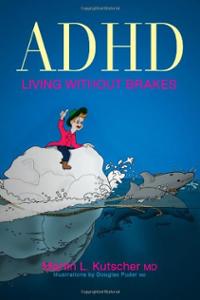While some parents prefer no medications for their children with ADHD, many others are administering them with good results.
The most common recommendation I hear is, “Use medication AND behavioral interventions.” Don’t just pop a pill and expect everything to come into focus. If a child or young adult does not know how to organize his school work, taking a pill that stimulates a neuro-receptor in his brain will not help him learn that executive skill.
For parents struggling with this decision, I would like to present the many “pros” I have read about medication. Yes, there are some “cons,” but these may happen to people who have other pre-existing conditions. The only way you can get these medications is from a medical doctor; you must discuss your child’s behaviors with an MD / psychiatrist before getting a prescription and giving them to your child.
Dr. Ed Hallowell is considered one of America’s leading experts on ADD — starting with the fact that he has ADD himself!
When medication works, it works as safely and dramatically as eyeglasses. Medication helps about 80% of the time in the treatment of ADD. Make sure you work with a doctor who can explain the issues around medication to you clearly. Most people do not realize how safe and effective stimulant medications truly are, when they are used properly. Make sure you work with a doctor who has plenty of experience with these medications. The stimulants include medications like Ritalin, Concerta, Adderall, Vyvanse, Focalin, and others. As long as you take them under proper medical supervision, they can help you immensely. from https://www.drhallowell.com/add-adhd/add-adhd-treatment/

Dr. Thomas Brown, Associate Director of the Yale Clinic for Attention and Related Disorders, Fellow of the American Psychological Association, and developer of the Brown ADD Scales for Children and Adults. These quotes are from his book, A New Understanding of ADHD in Children and Adults, Executive Function Impairments (NY: Routledge, 2103).
For ADHD, adequate education of the patient and family about the nature and treatment of ADHD is an essential aspect of minimizing suffering and damage; it is also a critical factor in eliciting willingness of the patient to engage adequately in the treatment process (p.98).
A regimen of appropriate medication, well-tailored to the specific individual, cannot cure ADHD, but for about 80% of those affected it may provide significant reduction of impairment and substantial improvement of functioning (p. 99).
Side effects: Stimulants are the most widely used medications for treatment of ADHD; some types have been available since the late 1930s, others since thelate 1950’s… Large studies of children and adults with aDHD taking stimulants compared with others of similar age have shown that the rate of serious adverse cardiovascular events such as sever hypertension, heart attacks or strokes is no greater among those treated with stimulants than in the general public of the same age without such treatment (p. 10).
Judith Warner is a best-selling author and journalist. In her recent non-fiction book, We’ve Got Issues: Children and Parents in the Age of Medication (NY: Riverhead Books, 2010), she admits that she started her research on this book assuming that doctors were over-medicating kids, and parents weren’t doing enough “parenting” and just wanted a quick fix. She concluded that not enough people are getting the medication they need for attention disorders! Here, she shares a conversation she had with a parent of a 9-year-old boy who was finally given Ritalin after struggling every year in school:

“My son said, ‘My brain is like a chameleon. You know, chameleons have eyes that don’t look straight ahead — that’s how my brain is. But when I take the vitamins’ — that’s what we called the Ritalin — ‘my eyes look straight ahead.’ The chameleon image — it’s hard to refute that. If your kid has chameleon eyes, it’s really hard to tell him to make them go straight ahead” (p. 89).
Dr. Martin L. Kutscher, a medical doctor who specializes in working with children with ADHD, has written a book called ADHD: Living Without Brakes (Philadelphia, PA: Jessica Kingsley Publishers, 2010).
Practically speaking, medication is never our first or only choice of treatment. By the time a child is brought to my office, years’ worth of attempts to finesse, cajole and punish have already been tried… The largest, national US study on ADHD treatments, called the MTA (1999) study, clearly showed that medication — especially tightly, professionally supervised use of medication — was clearly the most effective treatment strategy (p. 108).
